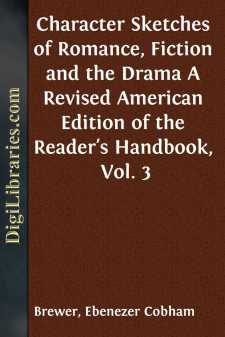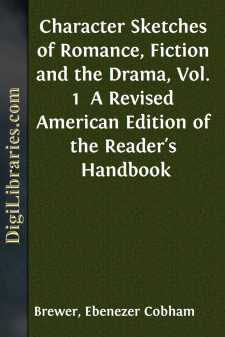Categories
- Antiques & Collectibles 13
- Architecture 36
- Art 48
- Bibles 22
- Biography & Autobiography 813
- Body, Mind & Spirit 142
- Business & Economics 28
- Children's Books 17
- Children's Fiction 14
- Computers 4
- Cooking 94
- Crafts & Hobbies 4
- Drama 346
- Education 46
- Family & Relationships 57
- Fiction 11829
- Games 19
- Gardening 17
- Health & Fitness 34
- History 1377
- House & Home 1
- Humor 147
- Juvenile Fiction 1873
- Juvenile Nonfiction 202
- Language Arts & Disciplines 88
- Law 16
- Literary Collections 686
- Literary Criticism 179
- Mathematics 13
- Medical 41
- Music 40
- Nature 179
- Non-Classifiable 1768
- Performing Arts 7
- Periodicals 1453
- Philosophy 64
- Photography 2
- Poetry 896
- Political Science 203
- Psychology 42
- Reference 154
- Religion 513
- Science 126
- Self-Help 84
- Social Science 81
- Sports & Recreation 34
- Study Aids 3
- Technology & Engineering 59
- Transportation 23
- Travel 463
- True Crime 29
Character Sketches of Romance, Fiction and the Drama A Revised American Edition of the Reader's Handbook, Vol. 3
Categories:
Description:
Excerpt
CHARACTER SKETCHES OF ROMANCE, FICTION, AND THE DRAMA.
Mark Tapley, a serving companion of Martin Chuzzlewit, who goes out with him to Eden, in North America. Mark Tapley thinks there is no credit in being jolly in easy circumstances; but when in Eden he found every discomfort, lost all his money, was swindled by every one, and was almost killed by fevers, then indeed he felt it would be a real credit “to be jolly under the circumstances.”—C. Dickens, Martin Chuzzlewit (1843).
Markham, a gentleman in the train of the earl of Sussex.—Sir W. Scott, Kenilworth (time, Elizabeth).
Markham (Mrs.), pseudonym of Mrs. Elizabeth (born Elizabeth Cartwright), authoress of History of England, etc.
Markleham (Mrs.), the mother of Annie. Devoted to pleasure, she always maintained that she indulged in it for “Annie’s sake.” Mrs. Markleham is generally referred to as “the old soldier.”—C. Dickens, David Copperfield (1849).
Marksman, one of Fortunio’s seven attendants. He saw so clearly and to such a distance, that he generally bandaged his eyes in order to temper the great keenness of his sight.—Comtesse D’Aunoy, Fairy Tales (“Fortunio,” 1682).
Marlborough (The duke of), John Churchill. He was called by Marshal Turenne Le Bel Anglais (1650-1722).
Marlow (Sir Charles), the kind-hearted old friend of Squire Hardcastle.
Young Marlow, son of Sir Charles. “Among women of reputation and virtue he is the modestest man alive; but his acquaintances give him a very different character among women of another stamp” (act i. 1). Having mistaken Hardcastle’s house for an inn, and Miss Hardcastle for the barmaid, he is quite at his ease, and makes love freely. When fairly caught, he discovers that the supposed “inn” is a private house, and the supposed barmaid is the squire’s daughter; but the ice of his shyness being broken, he has no longer any difficulty in loving according to his station.—Goldsmith, She Stoops to Conquer (1773).
When Goldsmith was between 16 and 17 he set out for Edgworthstown, and finding night coming on, asked a man which was the “best house” in the town—meaning the best inn. The man pointed to the house of Sir Ralph Fetherstone (or Mr. Fetherstone), and Oliver, entering the parlor, found the master of the mansion sitting at a good fire. Oliver told him he desired to pass the night there, and ordered him to bring in supper. “Sir Ralph” knowing his customer, humored the joke, which Oliver did not discover till next day, when he called for his bill. (We are told in Notes and Queries that Ralph Fetherstone was only Mr., but his grandson was Sir Thomas).
Marmaduke Wharne. Eccentric old Englishman long resident in America. Benevolent and beneficent, but gruff in manner and speech.—A. D. T. Whitney, Leslie Goldthwaite’s Summer (1866).
Marmaduke (Sir). A man who has lost all earth can give—wealth, love, fame and friends, but thus comforts himself:
“I account it worth
All pangs of fair hopes crossed,—
All loves and honors lost,—
To gain the heavens, at cost
Of losing earth.”
Theodore Tilton, Sir Marmaduke’s Musings (1867)....



